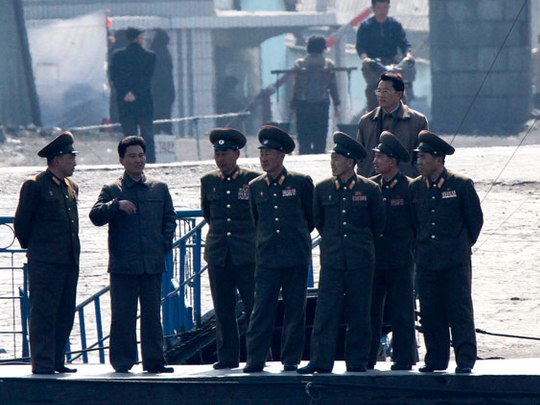
Seoul: South Korea raised its military watch alert to “vital threat” Wednesday before an expected North Korean missile launch, as UN chief Ban Ki-moon warned the Korean peninsula may be slipping out of control.
The North last week, told foreign diplomats in Pyongyang they had until April 10 to consider evacuation, fuelling speculation a launch was planned between Wednesday and the April 15 birthday celebrations for late founder Kim Il-Sung.
South Korean intelligence says the North has prepared two mid-range missiles for imminent launch from its east coast, despite warnings from ally China to avoid provocative moves at a time of soaring military tensions.
South Korean Foreign Minister Yun Byung-Se told parliament the launch could take place “anytime from now on” and warned Pyongyang it could trigger a fresh round of UN sanctions.
On Tuesday, the North reiterated a warning that the peninsula was headed for “thermo-nuclear” war and advised foreigners to consider leaving South Korea.
In a further sign of rising nuclear tensions, a key border crossing between North Korea and China has been closed to tourist groups, a Chinese official said Wednesday.
The South Korea-US Combined Forces Command raised its “Watchcon” status from three to two in order to reflect indications of a “vital threat”, Yonhap news agency said, citing a senior military official.
Watchcon four is in effect during normal peacetime, while Watchcon three reflects indications of an important threat. Watchcon one is used in wartime.
In a separate report, Yonhap quoted a government source as saying Pyongyang might be preparing “multiple” launches, after other launch vehicles were reportedly detected carrying shorter-range SCUD and Rodong missiles.
Although the North’s warnings to embassies in Pyongyang and foreigners in the South were both largely shrugged off, there is growing global concern that sky-high tensions might trigger an incident that could swiftly escalate.
UN Secretary General Ban Ki-moon said during a visit to Rome that he had spoken to the Chinese leadership to try to calm tensions, and would discuss the issue with US President Barack Obama on Thursday.
“The current level of tension is very dangerous, a small incident caused by miscalculation or misjudgement may create an uncontrollable situation,” Ban said.
White House spokesman Jay Carney, meanwhile, criticised Pyongyang for more “unhelpful rhetoric” that only served to create more uncertainty.
North Korea has wielded the “thermo-nuclear war” threat several times in recent months - most recently on March 7 - despite expert opinion that it is nowhere near developing such an advanced nuclear device.
The current crisis on the Korean peninsula has been intensifying almost daily since the North’s nuclear test in February, which drew toughened UN sanctions.
Incensed by ongoing South Korean-US military exercises, Pyongyang has accused Washington and Seoul of preparing an invasion and threatened dire military actions from artillery barrages to nuclear strikes.
South Korea last went to Watchcon two around the time of the North’s nuclear test, and its long-range rocket launch last December.
The Watchcon system solely relates to surveillance levels and is separate from the Defcon system of military preparedness.
The mid-range missiles mobilised by the North are reported to be untested Musudan models with an estimated range of anywhere up to 4,000km.
That would cover any target in South Korea and Japan, and possibly even US military bases on the Pacific island of Guam.
Japan, where the armed forces have been authorised to shoot down any North Korean missile headed towards its territory, said Tuesday it had deployed Patriot missiles in its capital as a pre-emptive defence measure.
But a top US military commander, Admiral Samuel Locklear, said Tuesday he favoured shooting down a North Korean missile only if it threatened the United States or Washington’s allies in the region.
If North Korea pushes ahead with the launch, the UN Security Council will convene immediately, Foreign Minister Yun said.
“It’s hard to predict what kind of action the Security Council might take, as the nature of such a launch would have to be analysed first,” he said, adding fresh sanctions were a possibility.












